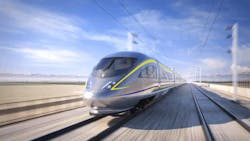CHSRA reaches agreement with Grassland Water District in environmental settlement
An agreement has been reached between the California High-Speed Rail Authority (CHSRA) and the Grassland Water District, Grassland Resource Conservation District and Grassland Fund (Grassland) that releases Grassland’s potential California Environmental Quality Act (CEQA) claims regarding the CHSRA’s adoption of environmental review documents for the San Jose to Merced portion of the high-speed rail project.
The agreement fosters a collaborative partnership between Grassland and the CHSRA as it works to connect the high-speed rail system from the Central Valley to the Bay Area while further building on its commitments to avoid and reduce impacts in the sensitive Grassland Ecological Area.
“This settlement reflects the hard work of state and local public agencies striving to protect natural resources and provide the public with new, state-of-the-art transportation that is clean, sustainable and reduces our collective carbon footprint," said CHSRA CEO Brian Kelly. "This agreement further reflects our organizations’ understanding that the best way to deliver these services is through collaboration.”
In sensitive wildlife areas along the planned high-speed rail corridor, such as Coyote Valley, Pacheco Pass and the Grassland Ecological Area, the CHSRA has incorporated project elements to allow for wildlife movement and protect the natural environment in its Final Environmental Impact Report/Environmental Impact Statement (EIR/EIS) (approved in 2022), which included wildlife crossings, an avian enclosure and noise barriers.
The settlement further commits the CHSRA and Grassland to a collaborative process during advanced design and construction in the Grassland Ecological Area, consistent with commitments in the CHSRA’s Final EIR/EIS. The agreement provides additional environmental protections by including measures to address the impact of noise, visual disturbances and wildlife movement by adding an extended sound wall near the Volta Wildlife Area, additional measures to reduce disturbance of wildlife during construction and a process to consider the placement of the avian enclosure during advanced design.
The CHSRA and Grassland will also work in good faith to identify opportunities for conservation easements and other areas where mutual support would be beneficial, including, but not limited to, the pursuit of grant or legislative funding opportunities.
The CHSRA has begun work to extend the 119 miles under construction to 171 miles of electrified high-speed rail from Merced to Bakersfield. Since the start of construction, the CHSRA has created nearly 14,000 construction jobs, with more than 70 percent going to residents from disadvantaged communities.
